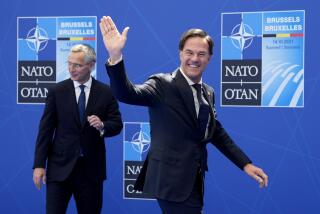Allied Commanders Face Daunting Task : Military: An American officer and a Briton will coordinate any air strikes. They confront each other, their superiors--and Serbs.
- Share via
WASHINGTON — If the United States and its NATO allies launch air strikes against the Bosnian Serbs, U.S. Adm. Jeremy Boorda and British Lt. Gen. Michael Rose are likely to end up as the men in the middle.
Should the Serbs fail to comply with today’s 4 p.m. Pacific time deadline to remove their artillery from within a 12-mile radius of Sarajevo or turn it over to U.N. peacekeeping troops, Rose, a British special forces commander in charge of U.N. troops in Bosnia-Herzegovina, will make the initial recommendations on whether to begin the attacks.
The blunt-spoken Boorda commands the NATO air armada that would carry them out.
Both are widely recognized as competent, decisive officers with proven combat records. Rose secured the orderly surrender of the Falkland Islands by the invading Argentines in the 1982 war. Boorda has run the NATO operation enforcing a U.N.-imposed “no-fly” zone over Bosnia.
But military experts say their biggest frustrations are likely to come when they attempt to get their respective organizations to agree clearly on what the allied forces should do in Bosnia.
“Their biggest challenge will be in dealing with the NATO command structure and the U.N. command structure--particularly with those who are making the political and diplomatic decisions,” said retired U.S. Marine Lt. Gen. Bernard E. Trainor. “The military action will be fairly straightforward.”
Indeed, bureaucratic entanglements already have clouded the allied operation in Bosnia.
In a major embarrassment, the two organizations split sharply last week over what it would take for the Serbs to meet the NATO deadline. The North Atlantic Treaty Organization said the Serbs must move their artillery 12 miles from Sarajevo, while U.N. commanders insisted that they could keep their guns in place.
Rose and Boorda have since worked out a compromise, but they were forced to negotiate amid a raft of second-guessing--and conflicting signals--by political officials, which some analysts said could give the Serbs just the opening they needed to equivocate.
Compounding the difficulty of coordinating any military action, insiders say, are the two leaders’ decidedly different operating styles. They diverge markedly in their views on the use of force, a factor that could heighten tensions even further.
The 54-year-old Rose, a tall, lean, smooth-talking, Oxford-educated infantry officer with an old-school charm and a penchant for the unusual, is known as a risk-taker who often comes up with creative solutions.
At the peak of the Falklands War, for example, after leading a series of commando raids against enemy troops, he used psychological warfare to help bring about a settlement, once breaking into a radio program to deliver a message to Argentine military leaders.
A few years before, he had won a reputation for derring-do in a rescue of 19 hostages who were being held during a siege at the Iranian Embassy in London. The dramatic gun battle, waged by Rose’s black-hooded Special Air Service soldiers, was carried live on TV.
By contrast, Boorda, 55, a short, stocky, pipe-smoking, high school dropout who joined the Navy--illegally--at age 16 and rose to destroyer captain, is a quintessential policy-maker and planner.
Although both have made the obligatory assertions that the West will launch air strikes if the Serbs do not obey allied orders, Rose--in a move that appears to be out of character--seems to have sought to avoid armed confrontation, even at the risk of undercutting the NATO ultimatum.
Early this week, he initially dismissed NATO demands that the Serbs obey the NATO ultimatum to the letter, then blithely reversed himself after the United States--and other key NATO governments--reacted in horror.
U.S. officials are convinced that once the deadline has passed, Rose will do everything possible to avert ordering air strikes, as long as the Serbs provide him with even the slightest excuse to say that they are cooperating.
Boorda, on the other hand, is a disciple of the hard-line U.S. doctrine that says once the allies have threatened to employ military force, they should not hesitate to do it with sufficient power to uphold their credibility. And he has said so several times in public.
Besides their significant policy differences, the two men also must contend with the continuing split between NATO and the United Nations over how to handle the situation in Bosnia.
U.N. policy-makers, more reluctant to use force on general principle, are especially wary in this case because the United Nations has about 13,000 peacekeeping troops on the ground--British, French, Canadian, Spanish and Dutch--who would be vulnerable to retaliation if the Serbs became angered.
Since these same countries are key powers in NATO, the alliance is split internally--a factor that has influenced both bodies’ deliberations for months. While some NATO countries are loath to launch air strikes, others support them, if only to bolster NATO’s credibility.
Complicating the overall situation is the fact that the Serbs and Muslims--much like the Iraqis--are masters at testing allied resolve. They move to within inches of a Western-set line in the sand and then pull back before NATO can muster the will to act.
Analysts say that, in turn, is likely to make clear-cut decisions even more difficult.
To be sure, Boorda and Rose are not the first military officers to experience problems with their political bosses. French Gen. Jean Cot, commander of U.N. forces in the former Yugoslav federation, has been cut out of the decision-making in Bosnia. Although not yet relieved by his successor, he has been fired for criticizing U.N. control.
“I have spent a good part of my energy preserving my freedom of action (from the constraints of the U.N. bureaucracy) to the detriment of my essential mission,” he wrote in a still-unreleased departure letter to U.N. Secretary General Boutros Boutros-Ghali.
The Rose-Boorda relationship may not have to weather more than a couple of weeks. The admiral has been tapped to succeed Adm. Frank B. Kelso II as U.S. chief of naval operations and will be leaving his NATO post in mid-March. Rose will stay on indefinitely.
Times staff writers Carol J. Williams in Sarajevo and William Tuohy in London contributed to this report.
More to Read
Sign up for Essential California
The most important California stories and recommendations in your inbox every morning.
You may occasionally receive promotional content from the Los Angeles Times.











